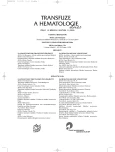Non-invasive fetal RHc genotyping from maternal peripheral blood
Neinvazivní RHc genotypizace plodu z periferní krve těhotných žen
V této prospektivní studii shrnujeme naše první zkušenosti s neinvazivní prenatální RHc genotypizací plodu s využitím PCR v reálném čase, specifických primerů a TaqMan sondy navržených pro c alelu RHCE genu. Celkem bylo testováno 13 nealoimunizovaných a 1 anti-c aloimunizovaných těhotných žen v rozmezí 12. až 33. týdne gravidity. Výsledky neinvazivní prenatální RHc genotypizace plodu provedené na DNA extrahované z periferní krve matek jsme korelovali s výsledky imunohematologické analýzy pupečníkové krve. Výsledky RHc genotypizace plodu byly ve shodě s vyšetřením pupečníku u všech vyšetřených těhotných žen. Neinvazivní prenatální RHc genotypizace plodu umožňuje identifikaci plodů v riziku hemolytického onemocnění. Detekce Rhc negativních plodů u anti-c aloimunizovaných těhotenství může vyloučit potřebu invazivního prenatálního vyšetření.
Klíčová slova:
fetální DNA, hemolytické onemocnění plodu, kvantitativní PCR v reálném čase, mateřská plazma, c alela, RHCE gen
Authors:
I. Hromadníková 1; J. Doucha 3; B. Benešová 2; K. Veselá 1; E. Rožňáková 2; A. Hakenová 4
Authors‘ workplace:
Pediatrická klinika
1; Krevní banka
2; Gynekologicko-porodnická klinika, 2. LF UK a Fakultní nemocnice Motol, Praha
3; Transfúzní oddělení, Fakultní Thomayerova nemocnice, Praha
4
Published in:
Transfuze Hematol. dnes,11, 2005, No. 1, p. 14-16.
Category:
Comprehensive Reports, Original Papers, Case Reports
Overview
In this prospective study, we described our first experience with non-invasive foetal RHc genotyping by analysis of DNA extracted from maternal plasma samples by using real-time PCR, specific primers and TaqMan probe targeted toward c allele of RHCE gene. We analysed 13 non-alloimmunised and 1 anti-c alloimmunised pregnant woman within 12th and 33rd week of pregnancy and correlated the results with serological analysis of cord blood. Non-invasive prenatal foetal RHc genotyping analysis of maternal plasma samples was in complete concordance with the analysis of cord blood in all pregnancies. Non-invasive foetal RHc genotyping enables the identification of foetuses at risk of haemolytic disease of the newborn. An identification of RHc negative foetuses in anti-c alloimmunized pregnancies may exclude the demand of invasive prenatal procedures.
Key words:
foetal DNA, haemolytic disease of the newborn, quantitative real-time PCR, maternal plasma, c allele, RHCE gene
Labels
Haematology Internal medicine Clinical oncologyArticle was published in
Transfusion and Haematology Today

2005 Issue 1
- Monitoring of Joint Health is an Important Part of Hemophilia Care
- Impact of Prophylaxis on Reducing the Risk of Neurological Problems Associated with Bleeding in Hemophilia A
- Minimum and Optimal Factor Levels in Physically Active Hemophiliacs
- Cost Effectiveness of FVIII Substitution Versus Non-Factor Therapy for Hemophilia A
- Vascular Disease in the Gradually Aging Population of Hemophiliacs: An Underestimated Problem?
-
All articles in this issue
- Endothelium and haemostasis
- Efficacy of rituximab as consolidation of first – line CHOP regimen in patients with follicular lymphomas
- Non-invasive fetal RHc genotyping from maternal peripheral blood
- First experience with non-invasive foetal RH genotyping from maternal peripheral blood in alloimmunised pregnancies
- Transfusion and Haematology Today
- Journal archive
- Current issue
- Online only
- About the journal
Most read in this issue
- Endothelium and haemostasis
- Non-invasive fetal RHc genotyping from maternal peripheral blood
- First experience with non-invasive foetal RH genotyping from maternal peripheral blood in alloimmunised pregnancies
- Efficacy of rituximab as consolidation of first – line CHOP regimen in patients with follicular lymphomas
